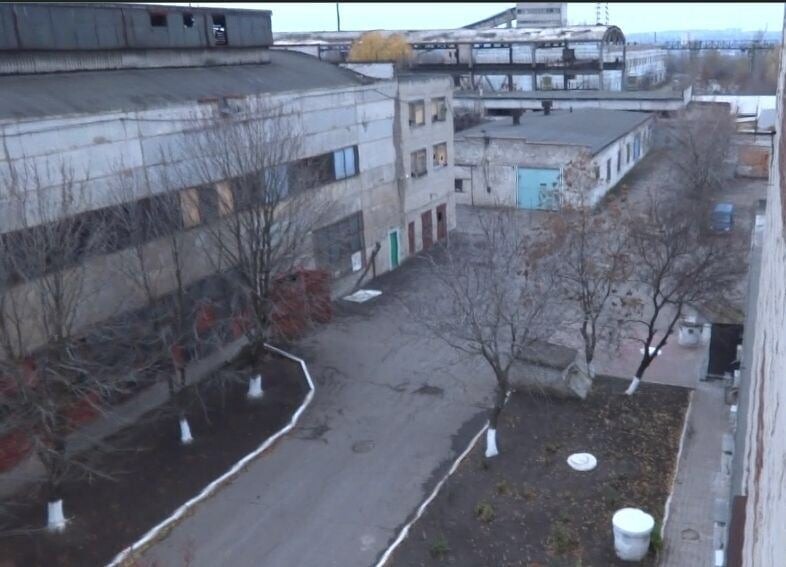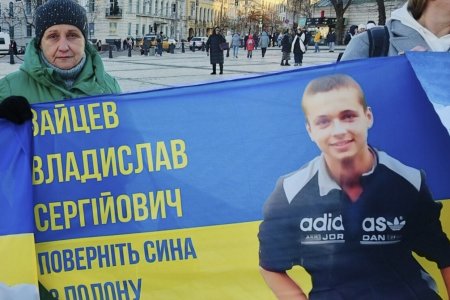
Only four civilian hostages, seized and tortured in occupied Donbas before Russia’s full-scale invasion of Ukraine, have been freed in exchanges of prisoners in the past five years. There are serious grounds for concern about very many others, including three men about whom nothing is known since they were supposedly released, but then seized again by the Russian FSB.
The release in June 2024 of Valery Matiushenko, Olena Piekh, Olena Fedoruk and Marina Yurchak brought huge relief as all had suffered horrific torture and years of captivity in Russia’s proxy ‘Donetsk people’s republic’ [‘DPR’].
This was, however, the only exchange of Donbas hostages since the end of 2019, and the torment of very many other Ukrainians held hostage continues. Valery Matiushenko spoke with Yulia Abibok from the Media Initiative for Human Rights [MIHR] about the lads he left behind in the Makiivka prison colony, and how some are close to breaking point. He is frustrated that, in the seven months since his release, he has not once met with top officials, despite repeated attempts to initiate such a meeting. He feels a sense of responsibility and wants to help those he left behind in prison, yet nobody seems interested in what is happening with those hostages.
This frustration has long been expressed by the families of other hostages who believe that the authorities are not persistent enough and not so concerned in these ‘old’ hostages, seized long before the full-scale invasion. It is true that the number of both prisoners of war and civilian hostages has massively increased since then. So too has the number of political prisoners, both because of the mounting repression in occupied Crimea and because of political ‘trials’ staged against Ukrainian civilians abducted from territory seized after February 2022 and against prisoners of war. It is, however, notable that the four Donbas hostages freed last year were people whose cases had been reported widely, not least because of the determination of their relatives. The others also need our voices in their defence.
In her important article, Abibok spoke of the wave of ‘arrests’ made in the so-called ‘Donetsk people’s republic’ [‘DPR’] from the middle of 2017. It seems that the Ukrainians are believed to have been seized after information was leaked when a Ukrainian Security Service [SBU] officer defected to the Russian side.
Many of these cases were reported here, as were the details of the torture hostages were subjected to in the ‘DPR secret prison’ at Izolyatsia. It was largely thanks to the testimony of former hostages freed in the two main exchanges of prisoners in December 2017 and 29 December 2019, such as writer Stanislav Aseyev, Stanislav Pechonkin and Halyna Haiova, that the crimes committed at this ‘concentration camp’ were known, as were the names of many of the victims. While it was only after its full-scale invasion of Ukraine that Russia began openly abducting civilians, holding them incommunicado with relatives not even knowing if they were alive, the same methods had been applied from the outset in the Russian proxy ‘Donetsk and Luhansk people’s republics’. One of the first things that freed hostages tried to do was, therefore, to get information about fellow prisoners to their families, and to the Ukrainian authorities. At Izolyatsia, both men and women were savagely tortured, with this both to extract supposed ‘confessions’, and ‘for their sadist captors’ ‘entertainment’.
While torture and the threat that it will be repeated are standardly used by the Russians to force out ‘confessions’, Abibok notes that, here, both the so-called ‘investigators’ and the puppet ‘lawyers’ under their control told the hostages to sign quickly. The claim was that the sooner the fake /court’ issued a sentence, the sooner the hostage would be released in an exchange. Then, however, the exchanges stopped, first because of the pandemic, and then because of Russia’s full-scale invasion.
Although former hostages, such as Halyna Haiova, have reported that Russians oversaw the ‘work’ of so-called investigators; it was only in February 2022 that Russia abandoned any pretence and, in September 2022, annexed the so-called ‘republics’. According to the former hostages with whom MIHR have spoken, there are around 50 political prisoners in ‘DPR’ prison colonies who were taken prisoner before 2022. There is no information at all about some of the prisoners.
It is unclear whether this figure includes the former Donbas hostages whom Russia has illegally put on trial at its notorious Southern District Military Court in Rostov. ‘Judges’ from that Russian court were entirely unbothered by the harrowing account of torture, systematic rape and threats against her small daughter provided by Natalia Vlasova (b. 1981). She, together with Serhiy Hruzynov (b. 1974) and Victor Shydlovsky (n. 1972) were tried under Russia’s flawed ‘terrorism’ legislation after being seized in ‘DPR’ back in 2018 or 2019, and sentenced to between 18 and 22 years. The same ‘court’ showed equally little interest in the very similar account of electric shocks, beatings and threats to torture his wife and child used by the ‘DPR’ militants back in 2019 to force Serhiy Kuris to sign their ‘confessions’. He was sentenced to 16 years under Russian legislation. Perhaps the most chilling case is that of Hryhory Sinchenko. He was subjected to savage torture at least twice while imprisoned in ‘DPR’ and has now been placed in the notorious FSB-controlled SIZO [remand prison] No. 2 in Taganrog where he is very likely being subjected to torture again.
Abibok explains that, after Russia claimed that the territory under its occupation had ‘joined the Russian Federation’, enforcement officers, etc. were sent to the proxy ‘republics’ to ‘review’ existing cases and bring them in line with Russian legislation. As reported, in some cases, such as that of neuropathologist Yury Shapovalov (b. 1964), Russia has set about ‘retrying’ people illegally held hostage for up to eight years.
Some have, however, been ‘released’ from SIZO. Serhiy Protasov, who had been imprisoned since 2017, was one of the lucky ones who really did go free at the end of 2022, although he lived in fear of being seized again for the year it took him to renew his passport and escape to government-controlled Ukraine. Olha Mozolevska and Ihor Mikheiev were seized in 2017 on suspicion of planning to abduct a DPR militant. They were ‘released’ in 2023 however, while Mikheiev was able to reach government-controlled territory, Mozolevska disappeared. Former hostages believe she was seized once again and is again imprisoned.

Such a repeat abduction seems likely given that the Russian FSB did precisely that in the case of Stanislav Boranov, Volodymyr Cherkas and Oleksandr Tytarenko. Although it is now clear that the men, and a fourth person who was probably killed while being taken prisoner, were seized in the same ‘case’, their families went through hell for over two years having no idea what had happened. It was only from former hostages released on 29 December 2019 that they learned that the men were alive, although all had been and were being held and tortured at Izolyatsia. Both Boranov, who is around 35 and has a young son, and Tytarenko, who is 49 and originally from Luhansk, had earlier defended Ukraine in Donbas. It is possibly for that reason that both men were imprisoned under different names, Stanislav Bozhko and Oleksandr Teploukhov, respectively, with this probably because they entered occupied territory under false documents. Throughout those first two years, Volodymyr Cherkas’s daughter, Marina Schiffer had desperately tried to find out what had happened to her father who had returned to Donetsk for his elderly mother, after his father died and who suffers from heart issues.
It now transpires that the men’s ‘case’ was reviewed by Russian ‘investigators’ in 2023, with the three men put on ‘trial’ in occupied Donetsk. At the end of December 2023 Valentyna Boranova received a letter from her son saying that he hoped to return home in 2024.
The final ‘hearing’ in the men’s ‘trial’ was scheduled for May 2024 with the men’s relatives all aware that the men were supposed to be released. Maryna Schiffer has told MIHR that she was already dreaming of seeing her father and was trying to work out how to get him out of occupied Donetsk. They were hoping to hear from Cherkas’ lawyer and civic defender that he had been released. Valentyna Boranova, in turn, was hoping for a phone call from her son, with friends waiting outside the ‘court.
Both learned later, Valentyna in the late evening, Maryna after 24 hours, that Boranov, Cherkas and Tytarenko had been seized by men in balaclavas, probably from Russia’s FSB, as they left the ‘court’. They had been forced into a car and driven away.
Abibok refers to unconfirmed information that the three men are being held in a SIZO [remand prison] in Russia’s Rostov or Belgorod oblasts. Aside from this, nothing at all is known about the men’s whereabouts, nor what has happened. Chillingly, all contact has also been lost, in Valentyna’s case with the friends who were waiting for her son, in Maryna’s with her father’s lawyer and civic defender.
Stanislav Boranov’s son is 12 years old and constantly asks why his father has not been released.
More details will be provided separately about other hostages seized by Russia’s proxy ‘republics’ and held prisoner to this day.



